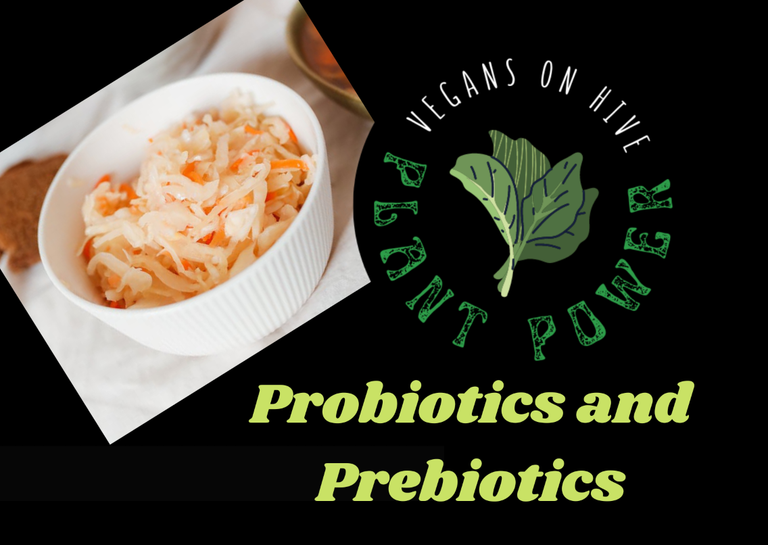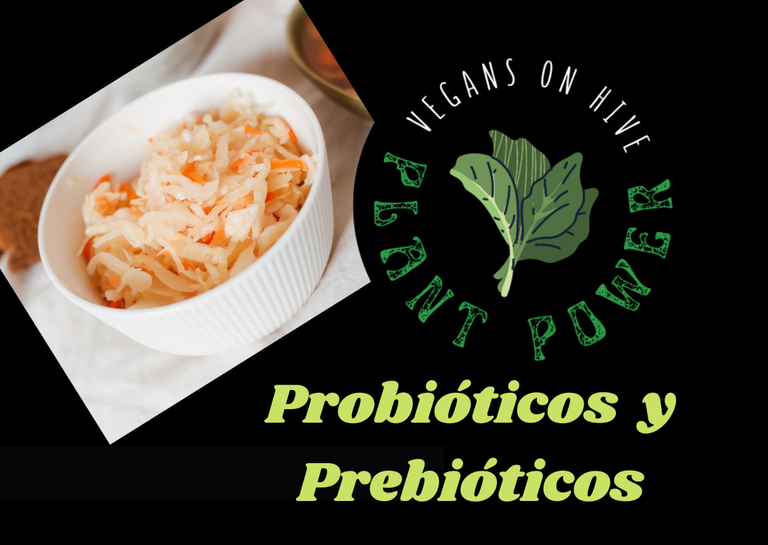
ENGLISH
Hello plant-based foodies, wherever you are in the world and/or galaxy!
Here @sirenahippie

Among the recommendations for maintaining intestinal health is the regular consumption of PREBIOTICS AND PROBIOTICS, terms that we may hear frequently from other people or see on social media and other media. It is also common for both terms to be confused and used indiscriminately, so we consider it appropriate to conceptualize and differentiate them, while also pointing out the benefits they offer to human health.

PROBIOTICS: These are live microorganisms that, in adequate quantities, are beneficial to health. They reside in the human digestive system. Their job is to regenerate and maintain the balance of the intestinal microbiota. Among the benefits they provide are the following:
- They optimize the intestinal system: Since probiotics establish and colonize the intestine in the free areas, and at the same time, they compete with harmful microorganisms, even eliminating them, they help the intestinal system to be healthy, and therefore, function better. In addition, they metabolize plant fibers that are part of the human diet.
- They improve digestion: When the intestine is healthy and balanced, it functions better, so the transit of the food bolus and then the feces is more fluid, avoiding congestion. In addition, the use of nutrients is more adequate..
- They produce substances that are beneficial to human health: Through their metabolism processes, probiotics can produce nutritious and beneficial elements for humans, known as POSTBIOTICS, for example: Fatty acids, enzymes, complex proteins, vitamins and amino acids, among others.
- They are adjuvants for strengthening vaginal health: They help maintain a balance of positive bacteria in this environment, and increase vaginal acidity, which prevents certain pathogens from surviving in this environment.
EXAMPLES OF FOODS THAT PROVIDE PROBIOTICS: Sauerkraut, kimchi, miso, tempeh, pickled vegetables (such as pickles), apple cider vinegar, sourdough, kefir, kombucha, natural sodas, kvass, cider, tepache, tejuino, chicha, yogurt, etc.
As you can see, there are compelling reasons to include PROBIOTICS in your daily diet, whether vegan or non-vegan.

PREBIOTICS: These are not living microorganisms. They are food, specifically specialized plant fibers. Prebiotics function as a stimulant and substrate for prebiotics and other healthy bacteria to grow, reproduce, and perform their metabolic functions. Prebiotics can be found in fruits and vegetables. Among the characteristics of prebiotics are:
- They are food: As already explained, they are specialized plant fibers, which serve as a substrate for the good bacteria present in the human intestine to grow.
- They are not digestible by humans: This means they pass from the stomach to the large intestine. There, they are metabolized by probiotics, primarily through fermentation processes.
- They are selective when it comes to stimulating the growth of bacteria: Prebiotics do not serve as a substrate for all the bacteria present in the microbiota, but only for those that are beneficial to human health.
EXAMPLES OF PREBIOTICS: Fruits, vegetables, nuts, seeds, etc.
Based on the above, there are also many reasons to consume PREBIOTICS daily, whether you are vegan or not.


ESPAÑOL

¡Hola amantes de los alimentos basados en plantas, donde quiera que estén en el mundo y/o la galaxia!
Aquí @sirenahippie

Dentro de las recomendaciones que existen para mantener la salud de nuestros intestinos, está el consumo regular de PREBIÓTICOS Y PROBIÓTICOS, términos que quizás oímos con mucha frecuencia de otras personas, o que los vemos en redes sociales y otros medios de comunicación. También suele ocurrir que ambos términos se confundan y sean usados de forma indiscriminada, por lo que consideramos adecuado conceptuarlos y diferenciarlos, a la vez que señalar las ventajas que ofrecen a la salud humana.

PROBIÓTICOS: Son microorganismos vivos, que en cantidades adecuadas, son beneficiosos para la salud. Residen en el aparato digestivo del ser humano. Su trabajo es regenerar y mantener el equilibrio de la microbiota intestinal. Dentro de los beneficios que aportan están los siguientes:
- Optimizan el sistema instestinal: Ya que los probióticos se establecen y colonizan el intestino en las áreas que están libre, y a la vez, ejercen competencia sobre microorganismos nocivos, llegando incluso, eliminándolos, ayudan a que el sistema intestinal esté sano, y por tanto, funcione mejor. Además, metabolizan fibras vegetales que forman parte de la dieta humana.
- Mejoran la digestión: Cuando el intestino está sano, equilibrado, funciona mejor, por lo que el tránsito del bolo alimenticio y luego de las heces, es más fluido, evitando contispación. Además, el aprovechamiento de los nutrientes es más adecuado.
- Producen sustancias beneficiosas para la salud humana: A través de sus procesos de metabolización, los probióticos pueden producer elementos nutritivos y beneficiosos para el ser humano, conocidos como los POSTBIÓTICOS, por ejemplo: Ácidos grasos, enzimas, proteínas complejas, vitaminas y aminoácidos, entre otros.
- Son coadyuvantes para fortalecer la salud vaginal: Ayudan a mantener un equilibrio de bacterias positivas en este entorno, e incrementan la acidez vaginal, lo que impide que ciertos patógenos sobrevivan en este ambiente.
EJEMPLOS DE ALIMENTOS QUE APORTAN PROBIÓTICOS: Chucrut, kimchi, miso, tempeh, vegetales encurtidos (como pepinillos), vinagre de sida de manzana, masa madre, kefir, kombucha, sodas naturales, kvass, sidra, tepache, tejuino, chicha, yogurt, etc.
Como pueden ver, existen razones de peso para incluir a los PROBIÓTICOS dentro de la dieta diaria, sea ésta vegana o no vegana.

PREBIÓTICOS: NO SON microorganismos vivos. Son comida, específicamente fibras vegetales especializadas. Los prebióticos funcionan como el estimulante y el sustrato para que los prebióticos y otras bacterias sanas, crezcan y se reproduzcan, y realicen sus funciones metabólicas. Los prebióticos los podemos encontrar en frutas y verduras. Dentro de las características de los prebióticos están:
- Son comida: Como ya se explicó, son fibras vegetales especializadas, que sirven de sustrato para que puedan crecer las bacterias buenas presentes en el intestino humano.
- No son digeribles por el ser humano: Esto significa que pasan del estómago al intestino grueso. Allí son metabolizados por los probióticos, especialmente por procesos de fermentación.
- Son selectivos a la hora de estimular el crecimiento de las bacterias: Los prebióticos no sirven de sustrato para todas las bacterias presentes en la microbiótica, sino para las que son beneficiosas para la salud humana.
EJEMPLOS DE PREBIÓTICOS: Frutas, vegetales, frutos secos, semillas, etc.
En base a lo anterior, también existen muchas razones para consumir PREBIÓTICOS a diario, ya seas o no vegano.

En base a lo anterior, les invitamos a consumir probióticos y prebióticos, siempre con asesoría de su médico o de su nutricionista.

BIBLIOGRAPHY / BIBLIOGRAFÍA

RELATED POSTS / POSTS RELACIONADOS
Vegetables and fruits: Pumpkin / Verduras y frutas: Calabaza (ENG / SPN)
Ideas for starting a vegan diet / Ideas para iniciar una alimentación vegana (ENG / SPN)
Vegan substitutes / Sustitutos veganos (ENG / SPN)
Vegetarian eating styles / Estilos de alimentación vegetariana (ENG / SPN)


Delegations welcome!
